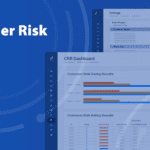AI is currently a hot topic for compliance professionals, and its features are proving to be advantageous in combatting fraud.
But did you know AI is also becoming a useful tool for regulatory agencies?
Increasingly, regulators are using AI-powered tools during their reviews to detect when fraudulent transactions are not being identified by businesses and imposing fines based on their findings.
The impact of cases like this is reverberating throughout the financial industry. It sets a precedent for more rigorous AML standards and should encourage organizations to adopt advanced technologies and data analysis tools to bolster their compliance efforts.
In a recent example involving the use of AI in regulatory oversight, the Autorite de controle prudentiel et de resolution (ACPR), France’s financial regulator, recently imposed a fine of €1.5 million on Credit Agricole, one of the nation’s leading banking institutions.
This financial penalty is the outcome of a meticulous investigation conducted by ACPR into Credit Agricole’s anti-money laundering (AML) practices, specifically focusing on the institution’s Languedoc division. The investigation found several deficiencies in Credit Agricole’s AML infrastructure, spanning from January 2018 to June 2020.
The primary areas of concern revolved around transaction-monitoring systems, customer due diligence processes, and the procedures employed for investigating suspicious payments.
ACPR’s report reveals that Credit Agricole’s transaction-monitoring system was based on an incomplete set of scenarios that rendered it incapable of detecting certain types of atypical transactions. For instance, the system would only flag cash deposits by individual customers for further investigation if they exceeded a substantial €14,000 per week, an amount considerably higher than the average monthly salary in the Languedoc region.
Moreover, the inspection discovered that key pieces of due diligence information, such as the sources of wealth and regular income of clients, were frequently missing from customer files. Equally concerning was the bank’s failure to investigate customers displaying red flags for financial crime, including clients who received transactions exceeding their reported income or those making unusually large cash deposits and withdrawals.
Banking institutions have received fines of this nature in the past, however this one is different because of how these deficiencies were found. The deficiencies in Credit Agricole’s AML practices were exposed through the use of an advanced artificial intelligence tool, LUCIA.
This tool, deployed by ACPR in recent years, played a pivotal role in analyzing a staggering 750 million transactions that were stored in a massive 540 gigabytes of data. LUCIA’s capabilities allowed regulators to scrutinize payment references, currency usage, beneficiary locations, and other data, while cross-referencing this information with customer due diligence files to identify suspicious financial activities.
One significant achievement of LUCIA, as highlighted by Matthias Laporte, an inspector with ACPR who led the LUCIA pilot project, is its ability to process massive amounts of data and recognize new patterns of suspicious activity. This stands in stark contrast to conventional data analytical tools that rely on monetary thresholds and pre-defined transactional scenarios.
The use of AI tools like LUCIA appears to signal a transformative shift in AML enforcement that empowers regulators with advanced technology to be more proactive and effective in identifying financial misconduct.
The implications of this case extend beyond the fine imposed on Credit Agricole. It also highlights the growing importance of AI and data analysis tools in the fight against financial crime.
These tools not only enable regulators to analyze massive datasets more efficiently but also to uncover previously undetectable patterns of suspicious behavior.
This enforcement action has the potential to set a precedent for more rigorous AML practices across the financial industry in France and possibly beyond.
The ACPR’s imposition of a €1.5 million fine on Credit Agricole serves as a significant milestone in the field of anti-money laundering enforcement. It underscores the importance of leveraging advanced technology, specifically artificial intelligence tools like LUCIA, in enhancing regulatory oversight and ensuring compliance within the financial sector.
The deficiencies identified in Credit Agricole’s AML practices during the inspection are indicative of a broader issue within the industry: The limitations of traditional AML systems and the need for more sophisticated solutions. The fact that these issues were uncovered through the use of LUCIA, an AI tool, demonstrates the pivotal role technology can play in identifying financial misconduct.
The fine imposed on Credit Agricole serves as a reminder that the fight against money laundering and financial crime is entering a new era characterized by the innovative application of artificial intelligence and data analytics. It is a call to action for financial institutions to adapt to these advancements, not only to avoid penalties but to better protect the integrity of the overall financial system.
Skylight, from epay, understands and leverages AI models throughout the platform’s many intuitive features. Don’t wait for regulators to use AI to find deficiencies. Stay ahead of the curve by using Skylight for your AML monitoring needs.
Read more about this case in this ACAMS article.
About the Author

Mayra De La Garza
Mayra is a compliance expert with extensive experience in the payments and financial services industry. She is currently serving as the Compliance Software Director for epay, where she leads the company's compliance software efforts. Mayra joined epay in July 2021 after spending 12 years at Walmart, where she served in various roles within the Financial Services space, specifically in the compliance space. Mayra's areas of expertise include payments, financial services, AML compliance, governance, and relationship management.
Throughout her career, Mayra has been recognized for her leadership, strategic thinking, and ability to drive results. She is passionate about compliance and ensuring that companies operate ethically and in compliance with applicable laws and regulations. Mayra holds a Master of Business Administration (MBA) from the University of Arkansas.




